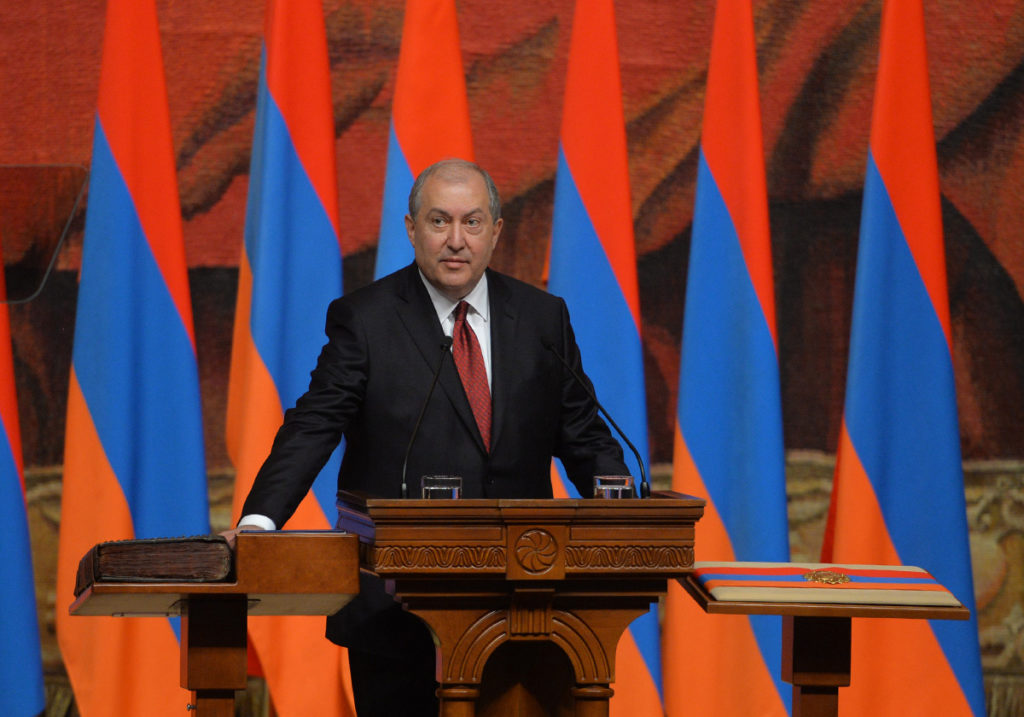As events are transpiring extremely quickly, here’s our roundup of main events from the last two days.
Earlier today, President Armen Sarkissian released an official statement expressing approval over the increased civic engagement the recent protests have evoked. “I am proud to see today’s Armenia,” he wrote, “and I am happy that I am going to live in tomorrow’s strong, united, fair and flourishing Armenia.”
Read English translation of the statement from Armenpress.

“The fact that the civil movement turned into a pan-national one in an organized and civilized manner is a matter of pride for all Armenians. From now on, we have a new page in our history. We live in a new Armenia… Denying this reality would be political shortsightedness.” The use of the term “նոր Հայաստան” (“nor Hayastan” which translates to “new Armenia”) is significant. Across social media, many are using the term to reference the idea that the country might finally leave behind residual negative practices and mentalities from its time as a Soviet republic.Sarkissian, an independent with no official ties to any party, also called for the need to find solutions that were “guided by the Constitution.” According to commentary from CivilNet, the president’s statement has thus far been well-received, particularly by youth.
The statement from the President was likely in response to confusion that has emerged recently over the question of who will become the country’s next prime minister, and perhaps more importantly, how they will enter into that role. So far, the only definite is that parliament will meet May 1 for the first round of elections. The deadline for nominating candidates for the PM role is April 30.
Opposition Member of Parliament, Nikol Pashinyan, who has led the protest movement so far, has alluded several times to the idea that he is the “people’s candidate,” without specifying exactly what that means. What is clear is his intention to—at least temporarily—lead the country. An explanation from local news site EVN Report indicated that while Pashinyan has not ruled out the possibility of parliamentary elections (which may, at this point, turn in his favor), he has ruled out the candidacy of acting PM Karen Karapetyan or any other member of the Republican Party. The hashtag of the movement has changed to reflect this shift in agendas—whereas it used to be simply “#RejectSerzh,” many protesters and also news sites are donning the hashtag “#RejectHHK” (HHK being the transliterated abbreviation of the Republican Party of Armenia or RPA).

Pashinyan stated that once elected, he intends to form an “interim government,” which will allow him to make reforms in the country’s Electoral Code and once it is confirmed that elections are “free and fair,” they will hold snap elections to vote for the next acting prime minister.
In the speech he gave at today’s rally, Pashinyan attempted to quell fears about his aspirations for PM: (paraphrased) “I want us to understand very clearly that the goal is not for me to become the Prime Minister, but to restore the corrupt, fragmented system of the government of Armenia [to fairness].”
He also invited Karen Karapetyan to the Marriott Hotel by noon tomorrow to “start the second part of negotiations.” As in his meeting with former President and now former PM Serge Sarkisian, he insisted journalists must be present to observe the negotiations. “I will take the post of prime minister in a way that lets every citizen feel that they are the prime minister of Armenia,” he said, as the crowd chanted “Nikol Varchapet” [“Prime Minister Nikol”]. For context, Pashinyan is himself a former journalist, and was for a time head editor at the local, daily newspaper, Haykakan Zhamanak.
“We are not going to reach any agreement behind closed doors with the Republicans,” said Pashinyan during his speech, “The power belongs to the people, the people are our bosses and we have to report to our supervisors for every step that we make.” He also thanked Marriott Hotel publicly, and referred to it as “a people’s brand, a vernacular brand.” He extended a similar gesture to the company, Grand Holding, conglomerate responsible for popular brands like Grand Candy and Grand Tobacco.
At the end of his speech, Nikol Pashinyan announced that all civil disobedience will be put on hold in Yerevan for tomorrow. He, along with his team and those supporters who want to join, will instead head to Gyumri to lead a rally there. He said that the movement’s supporters in Yerevan could use this time to rest. After Gyumri, he said he plans to go to Vanadzor on April 28. Many have commended his strategic efforts to engage Armenia’s regions outside the capital.
Pashinyan has also been strategic about vocalizing the movement’s good standing with Russia. According to a leading Russian multimedia site, RBC, he met with Russian Ambassador to Armenia Ivan Volynkin, whom he assured there was no hint of anti-Russian sentiments in his movement. During the meeting, the ambassador promised Russia would not interfere in what it has been calling Armenia’s “internal affairs.”
For context, Russian officials and state television have in the past proceeded with caution regarding political unrest in Armenia. Moscow is known to decry anti-government rallies in neighboring post-Soviet nations as “hostile Western interference,” says the Associated Press. That’s why it came as a surprise to many when following Serge Sarkisian’s abrupt resignation, Russian Foreign Ministry spokeswoman Maria Zakharova was quick to support the decision, “The people who have the strength to keep respect toward each other despite crucial differences and stay united even in the most difficult moments of its history is a great people,” Zakharova wrote on her Facebook page, “Armenia, Russia is always with you!” Since then, however, official statements from the Kremlin have been tepid.
Following the Armenian Revolutionary Federation’s (ARF) departure from its coalition with the Republican Party, the ARF announced today that three of its appointed ministers, Davit Lokyan (Ministry of Territorial Administration and Development), Levon Mkrtchyan (Ministry of Education and Science), and Artsvik Minasyan (Ministry of Nature Protection) will be resigning. The three ministers were appointed May 31, 2017. Also stepping down will be the Governors of Shirak and Aragatsotn provinces, Artur Khachatryan and Ashot Simonyan.
Also last night, members of the ruling RPA met with Serge Sarkisian and Armenia’s acting PM Karen Karapetyan last night. After the meeting, the party announced that it is finally ready to negotiate with Nikol Pashinyan without preconditions.
Additional Reading and Listening, from the International Community:
- Armenia Rejects the ‘Politics of Eternity’ on The Conversation
- Armenia Protests: What Happens Next on CNN
- Armenia’s New Challenges, How the West Should Respond by the Center for Strategic and International Studies



Great Coverage! I have been in Armenia the past two weeks and at many of the demonstrations. Your reporting is very informative and accurate. Thanks for the great work. I will rely on your accounts when I return home to the US.
It appears that Nikol’s main objective is to disband the HHK party. The problem is that would mean pretty much the entire government. So there is going to be a lot of work to do after that if it succeeds. Now who is to blame for all this except the party itself? What were they expecting when they kept both the diaspora and the home public unhappy all these years?
Fat belly Armenian Oligarchs won’t give up “Putin’s” order easily!
Let’s see what the ‘ Fat Brain ‘ Pashinyan will offer Armenians in The event he is picked as the next PM.